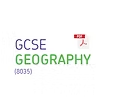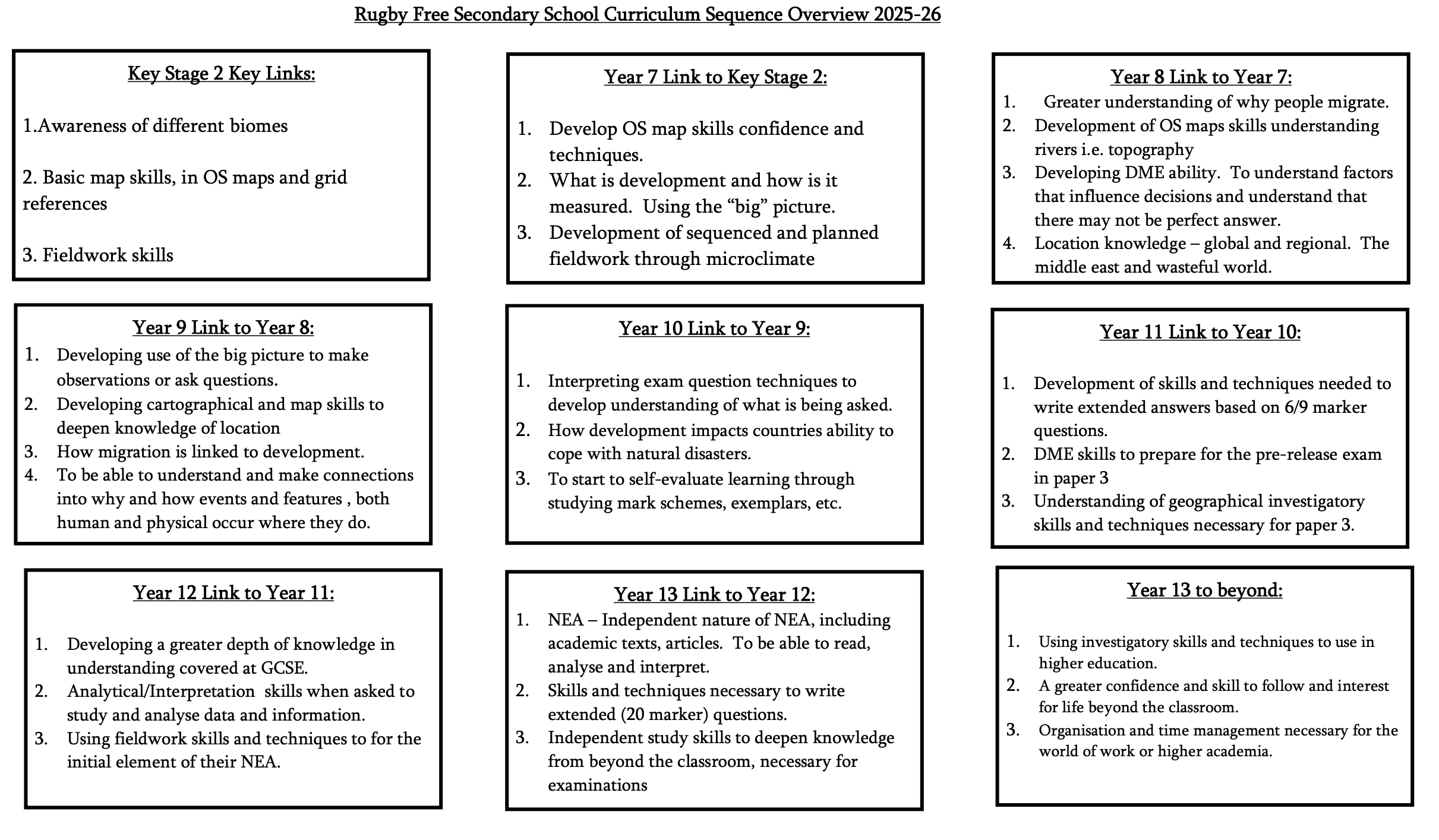Geography Department – Overarching Curriculum Intent (September 2025)
RFSS Curriculum Vision Statement:
To build an inclusive curriculum which is aspirational for all and empowers our students to make outstanding academic and personal progress.
Geography Curriculum in Context:
Geography is fundamental to a student’s education. It inspires a sense of awe and wonder and instils a respect and appreciation of diverse places, cultures, people and resources. Bringing together the complex interrelations of the human and physical world, the study of Geography is invaluable in addressing the challenges we face today. Geography is continuously evolving, and therefore we endeavour to offer a rigorous and responsive curriculum that supports the cultivation of curious and kind learners.
In creating our curriculum, the character of our school community (as below) has been carefully considered alongside the national and international context in which we live. For example,
- 60% of students at RFSS are White British, compared to 65% in Secondary schools across the country.
- 28% of students speak a language other than English as their home language.
- 50 different languages are spoken within our school.
- After English, the most common home languages are Polish and Romanian.
To reflect this, we have designed a curriculum that is both broad and balanced, introducing topics ranging from Africa and tourism to the extreme cold of Siberia and the humid tropical rainforests.
We provide a carefully sequenced and knowledge rich Geography curriculum that allows for the progressive development of students understanding of geographical concepts and skills. From Year 7 through to eventual A Level, students will hone in on concepts such as cause and effect, management, sustainability and conflict whilst developing skills such as drawing and reading graphs, reading maps and photo analysis.
Our curriculum comprises a balance of human and physical Geography. Students study a range of systematic units, as well as a regional unit in Year 7 and 8. Each student is provided with a visual curriculum map to ensure they are aware of their learning journey. We want our students to be curious about the world around them. To encourage this, each unit begins with an enquiry question. Throughout the unit, students become equipped with the knowledge and skills required to answer this question. This guides the lesson sequence and allows us to measure the impact of our curriculum.
Without a strong starting point, it is impossible to measure progress effectively. Therefore, every student completes a baseline assessment at the beginning of Year 7. We have a large number of feeder schools so it is important to gain an understanding of what a student knows and can do, as well as any gaps in their learning. This information is then used to inform the scaffolding and level of challenge required in the first unit, Where in the World. This unit focuses on the concept of scale and provides students with a grounding in geographical skills as well as knowledge of place.
Concepts and skills are continuously revisited, but in a more challenging capacity. For example, in Year 7 students are introduced to the concept of development early on in year 7 this concept is a thread throughout the KS3 course and revisited in topics such as natural hazards, and population in year 9. By revisiting concepts in different contexts, students can begin to make connections and develop their schema.
Every subject is communicated through its own unique language. Our curriculum develops student’s disciplinary literacy by providing opportunities to read and actively engage with challenging geographical texts. Some examples include extracts from Prisoners of Geography and Factfulness, as well as a range of articles, policy documents and fiction texts. We encourage students to strengthen their oracy when discussing and presenting ideas, and provide explicit vocabulary instruction to support students in accessing and using geographical terminology.
Barak Rosenshine’s Principles of Instruction (2012) and Doug Lemov’s Teach like a Champion (2014) strategies are employed to develop our teaching practice in Geography. We ensure students retain knowledge by interleaving learning. This leads to improved knowledge retention and allows students to make connections between concepts and ideas. Retrieval practice is used in every lesson in the form of Do it Now Activities (DIN) to ensure students are constantly reviewing their learning and addressing misconceptions. Within the DINs, students are given a challenge question which is used to stretch students beyond pure knowledge. We provide guided practice through the ‘I, We, You’ method and show call students work to maximise accountability and build resilience.
Students develop independence throughout key stage 3, 4 and 5. Initially at KS3 students are given independent activities through revision lessons and homework. This foundation is developed throughout KS into KS4 and 5, to become a normal part of the learning process.
Our curriculum aims to:
- Provide students with a secure knowledge of where places are and what they are like
- Students will respect and appreciation of diverse places, cultures, people and resources
- Students will have an understanding of the complex interrelations of the human and physical world
- Students will be able to express well-balanced opinions and support, evaluate and challenge the opinions of others
- Students will be able to plan, conduct and evaluate fieldwork collaboratively using geographical skills and techniques
- Students will be encouraged to be passionate about Geography and continue to be curious about our ever changing world.
We do this by:
- By providing opportunities to identify locations at various scales whilst studying the curriculum.
- Building opportunities for students to learn about different environments, cultures and current issues and events happening in the world today.
- Building a sequenced curriculum which presents opportunities for our students to engage with the links between humans and the environment, including the impact of climate change.
- Providing a balanced view so students can understand that issues can be complex and multi-layered.
- Providing opportunities to carry out fieldwork investigations both inside and outside of school.
- Support students and parents with information and guidance on how they can study and learn about geography from beyond the classroom.
Curriculum Outcome:
Our curriculum is focused on the development of communication, character and cultural capital of each individual student.
- Through our history curriculum we help develop confident young people who have a secure knowledge and understanding of people, events and contexts from the historical periods covered.
- Students will develop the ability to think critically about history and communicate confidently through their writing and oracy.
- The ability to support, evaluate and challenge their own and others’ views using detailed historical evidence derived from a range of sources.
- The ability to think, reflect, debate, discuss and evaluate the past.
- A passion for history and an enthusiastic engagement in learning, which develops their sense of curiosity about the past and their understanding of how and why people interpret the past in different ways.


